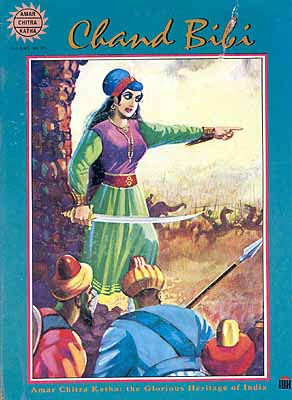 |
| Chand Bibi (1550–1599 CE).www.snipview.com |
Several centuries ago in the Muslim kingdoms just like Hindu kingdoms, the power of ruling the land was vested with only males. Ranies and Begams in their royal palaces were busy attending the daily routine chores, including personal care of the rulers, their children, their needs, etc. The male hegemony in the royal ruling class continued uninterrupted for centuries. However, in a kingdom or sultanate where there was no eligible male member to succeed the throne , the woman members never minded donning the role of male warriors and successfully defended their land against the invading armies as well as local enemies, and in doing so, they got a name for themselves by saving the land and restoring the legacy of the ruling class. Further, they successfully proved that women were equally capable and had the ability to prove their worth if an opportunity was given to them. Despite the prevalence of gender bias in the by-gone days, one Chand Bibi of Bijapur sultanate was such a daring woman who was never cowed down in defending her land, her people and the prestige of her dynasties.
Chand Bibi (1550–1599 CE), the Regent of Bijapur (now in Karnataka state) (1580–90) and Regent of Ahmednagar (1596–99) (now in Maharastra state) was a well known Muslim warrior, known for her valor and wisdom. Daughter of Hussain Nizam Shah I of Ahmednagar, and the sister of Burhan-ul-Mulk, the Sultan of Ahmednagar, she was a polyglot, well versed in many languages, including Arabic, Persian, Turkish, Marathi and Kannada. Her husband was Ali Adil Shah I of the Bijapur Sultanate. After her father-in-law and ruler Ibrahim Adil Shah I 's unexpected death in 1580, there was some power struggle among the Sunni nobles, the Habshis and the Deccanies who had equal share in the power as per the wish of the ruler. The Shia nobles declared nine-year-old nephew Ibrahim Adil Shah II as the ruler and Chand Bibi, became the regent during his minority from 1580 to 1584. When Ibrahim Adil Shah's sister married Miran Hussain, son of the ruler of Ahmednagar and brother of Chand Bibi, she also moved over to Ahmednagar. Mean while Kamal Khan, a Deccani military general seized power and became a regent. with support from Haji Kishvar Khan, another Deccani General Chand Bibi eliminated Kamal Khan and now Haji Kishvar Khan, became the regent.
 |
| Chand Bibi's Tomb, Ahmednagar.en.wikipedia.org |
Subsequently Haji Kishvar Khan, declared war on the Ahmednagar Sultanate at Dharaseo, after the stunning victory, he turned against Chand Bibi. Not discouraged Chand Bibi, in collusion with one General Mustafa, tried to eliminate Haji Kishvar Khan. Luck was in favor of Kishvar Khan who came to know about the plot to kill him well before hand. The moment he heard the conspiracy, he sent his troops, captured Gen. Mustafa and killed him later.. In the wake of this political debacle, Chand Bibi was captured and imprisoned in Satara (now in Maharastra) and Haji Kishvar Khan became a self-proclaimed ruler.
Haji Kishvar Khan, being arrogant and despotic, did not maintain good relationship with other generals and nobles. He became unpopular among them and the generals were waiting for an opportunity to throw him off power. A Habshi (an ethnic group descended from Bantu peoples from SE Africa) general called Ikhlas Khan with his army fought a fierce battle and at last Haji Kishvar Khan tried to escape to Golkonda kingdom (present day Telengana state). On the way he was caught and killed by a relative of Mustafa Khan. With the elimination all her enemies, Chand Bibi became the ruler and Ikhlas Khan, the regent. Soon Ikhlas Khan, attracted by the trappings of a powerful post, acted against the interest of Chand Bibi, so she removed him from the post. In the meantime the ruler of Ahmednagar had an alliance with the Sultan of Golconda, Qutb Shahi. Taking advantage of the political instability at Bijapur, their army attacked the armies of Chand Bibi. At their request the Maratha rulers came to the rescue of Chand Bibi, attacked the enemy supply lines and drove the combined armies of Golconda and Ahmednagar.
After the defeat of Ikhlas Khan, later another Habshi General Dilavar Khan became regent 1582 to 1591. When normalcy and order were restored Chand Bibi returned to Ahmednagar to lead the kingdom.
In all her struggles, as a leader of Bijapur, against various powerful rulers, Chand Bibi never lacked her spirit and fighting qualities. She, rather had put her temporary set backs way behind her mind and moved forward with more vigor and confidence, That is the reason why many military generals sought her collaboration and had abiding trust in her. She became a successful ruler of Bijapur Sultanate.








.jpeg)
